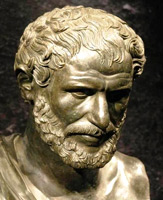What holds the world together?
 Although we are familiar with early western philosophers such as
Socrates, Plato and Aristotle, most of us are unaware of sophos who
lived prior to them. Sophos, a Greek word meaning ‘wise’, lived in
ancient Greece c. 500 BCE. Although we are familiar with early western philosophers such as
Socrates, Plato and Aristotle, most of us are unaware of sophos who
lived prior to them. Sophos, a Greek word meaning ‘wise’, lived in
ancient Greece c. 500 BCE.
The wise thinkers were mostly men who asked sophisticated questions
about the world, nature and man’s position in the universe. Although
religion and mythology had ready-made answers for most of the questions,
the first philosophers used their keen powers of observation to ask
questions. As in those days, even today one might ask whether it is
worth asking such perennial questions for which many religious leaders
and thinkers have given their answers.
The sophos was someone who did not do a regular job. He did not amass
wealth or desire fame and power. His only “job” was to ask “silly”
questions about life and the world in motion. He had no regard for
ordinary men and women who led a normal life. As a result, the earliest
image of a sophos was an unkempt, absent-minded dreamer who enjoyed
asking questions. He himself did not answer the questions and expected
to know what others thought of them. However, it was generally agreed
that a sophos was a wise man or a sage.
Philosophical questions
Although men dominated the scene, there were a few women who loved to
ask philosophical questions. Aesara of Lucania was a Pythagorean
philosopher relatively unknown to modern thinkers. In her book On Human
Nature she says that through the introspection and contemplation of our
own souls we can discover the “natural” foundation of all law and the
structure of morality. Like most other philosophers, Aesara harped on
the importance of reason as a guide while acknowledging the
all-pervading presence of emotions. However, contribution to philosophy
by women philosophers is minimal.
|

Heraclitus:
One cannot step twice
into the same river. |
The sophos was considered a kind of prophet, priest and therapist in
ancient Greece. Although he was not necessarily a wise man, he loved
wisdom and was a truth-seeker. Although a modern philosopher is expected
to live a normal life, doing a job and devoting his energies to think
about certain questions central to man in a rational way, a sophos was
quite a different man. In the history of western philosophy, the sophos
was the forerunner of the modern philosopher.
The sophos belonged to the pre-Socratic philosophical tradition. Some
of them were known as “proto-scientists” because they transformed
mythology into rational inquiry. As they lived in a world quite
different from ours, some of their questions may appear to be
meaningless. Against this background, the first western philosopher
appeared. He was Thales (c. 624 - 545 BCE) who lived in Miletus which
was a Greek colony. According to a story narrated by Plato, Thales once
fell into a well “when he was looking up to study the stars.” Thus Plato
branded Thales as an “absent-minded” philosopher.
Rational evidence
For Thales the basic “stuff” of life was water “because the seeds of
everything had a moist nature.” Thales’s theory came as a surprise to
those who believed in mythical stories. For the first time he based his
theory on rational evidence and careful observation. Like a true
philosopher he came out with a rational discourse and invited others to
accept or reject his views.
Anaximander, a pupil of Thales, came out with the stunning disclosure
that the earth stays where it is because it is at the precise centre of
the cosmos. Eminent Greek philosopher Aristotle said that Anaximander’s
reasoning rested on the principle that “nothing happens without a
reason.” Even today philosophers agree with this view. Anaximander going
a step further than his guru said that the earth was fluid at the
beginning. An extreme source of heat dried some parts of it.
Today the dried sections have become land. Similarly, living
organisms arose at various stages of the drying process. Later on his
views influenced the Theory of Evolution. Anaximander’s pupil Anaximenes
went a step further and said, “pneuma” (air) was the ultimate spirit
that holds the world together.
Heraclitus (c. 500 BCE) also considered what holds the world
together. He is credited with “Logos”, one of the richest and most
complex terms in ancient philosophy. Logos could mean intelligence,
speech, discourse, thought, reason, word or meaning. Heraclitus’s Logos
is like god. It is a process, not an entity.
Aphorism
Heraclitus is well known for his aphorism, “Everything is in a state
of flux, or change and war and strife between opposites is the eternal
condition of the universe.” He ridiculed Homer and said that he should
have been whipped for coming out with weird ideas. Heraclitus also
questioned the intellectual integrity of Pythagoras and Xenophanes. He
thought the principal elements of nature were fire, earth and water. Out
of them fire was the primary element which controlled the other two.
Mirroring the oriental concept of Yin and Yang, Heraclitus said the
dynamism between opponents was the driving force of the universe.
According to him “God is day and night, winter and summer, war and
peace, fullness and hunger.” Strife and opposition are necessary. While
opposites may enjoy periods of alternating dominance, none shall ever
completely extinguish or vanquish the other.
Heraclitus was a mystic like his Chinese counterpart Lao Tzu.
Although there are a lot of similarities between their writings, it is
not clear whether one was influenced by the other. However, Heraclitus’s
doctrine of flux has been accepted by many modern philosophers including
Henri Bergson. |

